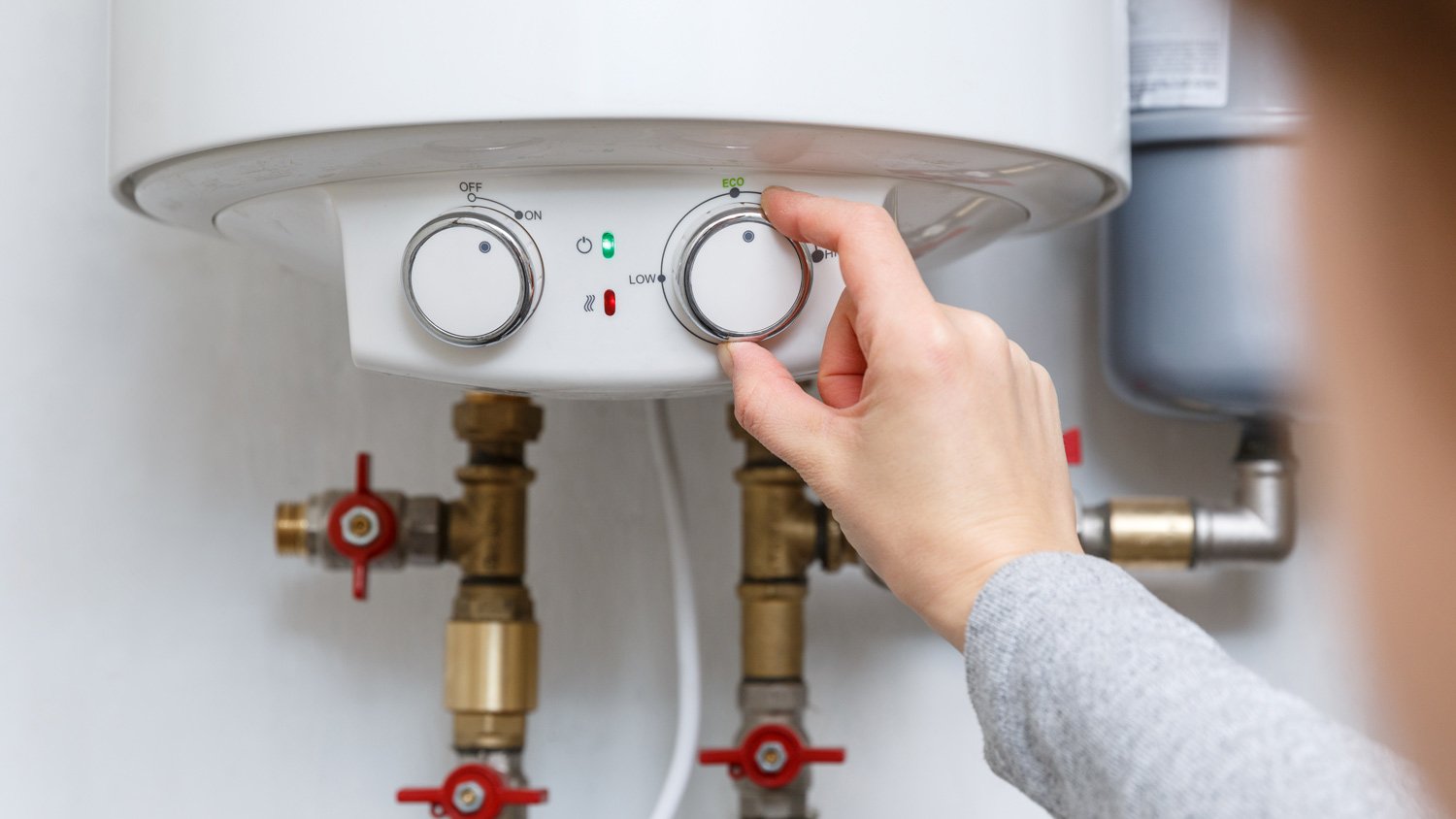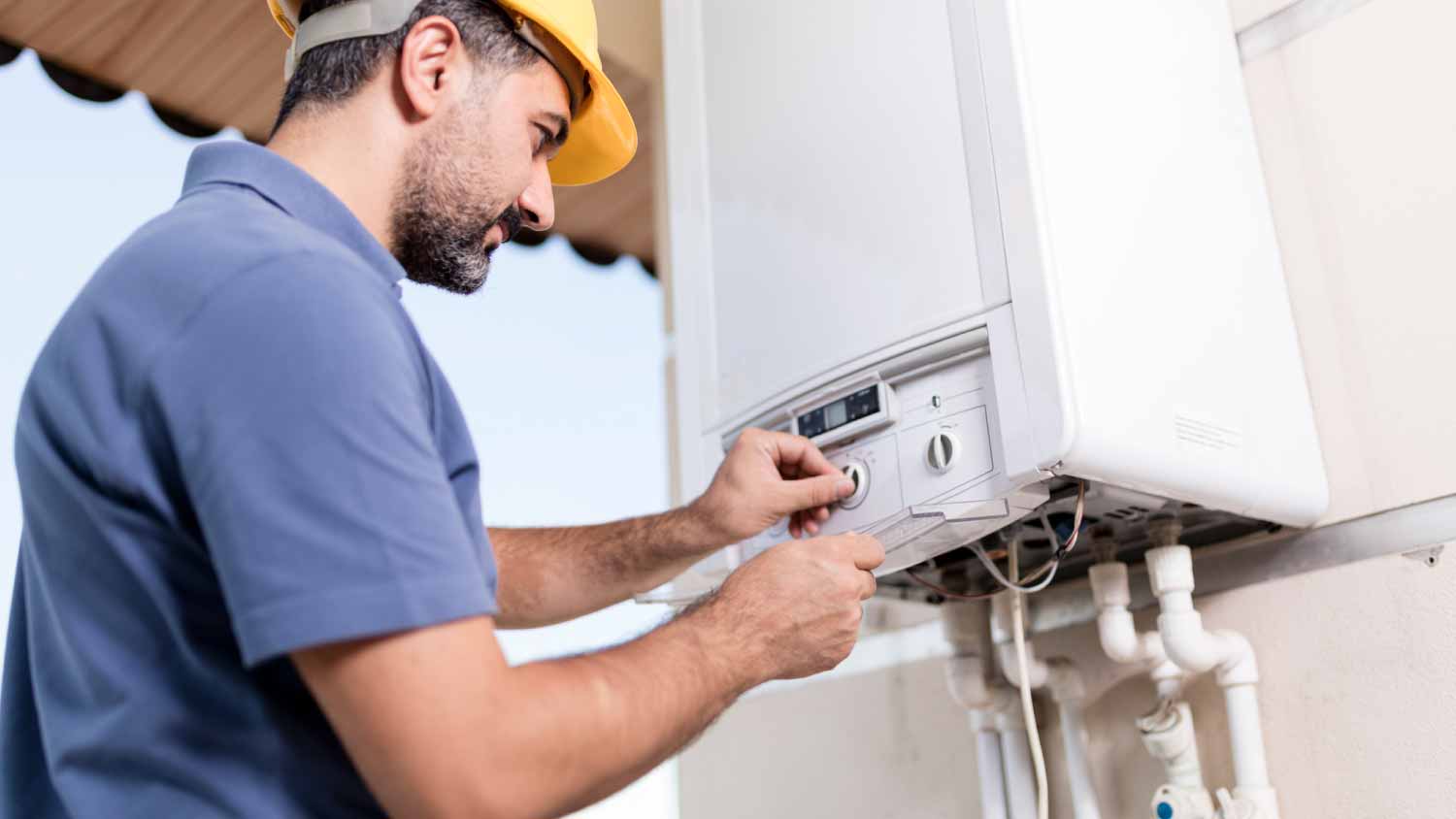How Much Does It Cost to Flush a Water Heater? [2025 Data]
The average U.S. homeowner spends about $160 to flush a water heater. Depending on the type, size, location, and labor, most spend between $110 and $200.


Your average water heater flush cost falls around $160, with most prices ranging from $110 to $200 depending on several factors. If your water heater sounds like a new garage band’s drum solo and is accompanied by lukewarm temps, it’s probably time to flush your water heater. Here’s a close look at the different aspects that can impact your water heater flush cost to help you budget.
Water Heater Flush Cost Breakdown
The cost to flush a water heater can depend on the type of water heater, tank size, materials, labor, and more. Use the following breakdown to help you navigate the cost of your water heater flush.
Types
Choosing the best water heater type for your home is already a decision that can impact costs, but maintenance costs like flushing your water heater can also be affected by which one you choose. Overall, tankless water heaters cost $75 to $100 more to flush than tank water heaters due to the different water heater components.
| Water Heater Type | Average Cost Range | Average Cost |
|---|---|---|
| Tank water heater | $75–$150 | $115 |
| Tankless water heater | $150–$250 | $200 |
Tank Size
The national average cost to flush a water heater is $160, but prices can vary in increments based on the tank size. A 30-gallon tank will cost between $90 and $120 on average, while a 70-gallon tank could cost anywhere between $180 and $250.
Your water heater’s capacity can increase or decrease the time it takes to wait for the water to cool, drain the tank, flush the tank with cool water, and refill it during the flushing process. This means that larger water heater tanks could cost more to flush if you hire a plumber who charges by the hour. The number of people in your home affects the size of your tank, so larger households may cost more to flush a water heater than smaller households.
Here’s a closer look at water heater sizes and the typical price range that goes along with each size.
| Number of Residents | Water Heater Capacity (Gallons) | Price Range |
|---|---|---|
| 1–2 | 30–40 | $90–$120 |
| 2–4 | 40–50 | $120–$150 |
| 3–5 | 50–60 | $150–$180 |
| 5+ | 60–80 | $180–$250+ |
Labor
Plumbers cost anywhere between $45 and $200 per hour, depending on experience. Not all plumbers charge by the hour, however. Some plumbers charge a flat rate fee ranging from $100 to $400. Expect your local plumber to have a minimum charge for servicing your water heater. It takes around one to three hours to flush a water heater, so you'll spend between $45 and $600 if you hire a professional.
Level of Expertise
Again, the more experience your plumber has, the more you may end up paying to flush your water heater. Apprentice plumbers charge the least, master plumbers charge the most, and journey-level plumbers charge somewhere in between.
Apprentice: $45–$90 per hour
Journey-level: $70–$120 per hour
Master: $90–$200 per hour
Location
Regions with harder water may need more frequent water heater flushing to keep sediment out of the tank. You can learn how to test water hardness to see how hard your tap water is and determine how often you should flush your water heater.
Water Heater Flush Cost by Type

Choosing between a tankless vs. tank water heater is already a decision that can impact upfront costs, but long-term maintenance costs like flushing your water heater can come with additional expenses worth considering.
Tank Water Heater Flush Cost
Your conventional water heater is a tank-style water heater. The cost to flush a tank water heater ranges between $75 and $150. These water heaters are cheaper to flush overall because of how simple the process is. However, flushing your tank means you'll need to refill the entire tank with water and use energy to heat the new water once it's full.
A tank water heater costs between $600 and $2,500 to install, and its cheaper price tag for flushing the tank means you’ll save in maintenance and upfront costs. However, tank water heaters are less efficient than their tankless water heater counterparts.
Tankless Water Heater Flush Cost
Overall, tankless water heaters cost more to flush than traditional water heaters. This is because they are more complex than traditional water heaters and may need more frequent flushing to help curb limescale and sediment buildup. As such, you’ll spend anywhere between $150 and $250 on average to flush your tankless water heater.
Tankless water heaters cost between $1,400 and $3,800 to install, but their energy efficiency means you could conserve anywhere from 8% to 34% more energy than your traditional storage tank water heater, according to Energy Saver.
Water Heater Flush Ongoing Expenses
On top of your up front cost for flushing a water heater, you also have several ongoing expenses to keep in mind, including maintenance and repair costs.
Maintenance
A one-time visit could cost more than a contract with a local water heater company. Some professionals offer discounts on annual, seasonal, or monthly contracts. Investing in routine maintenance for your water heater can also help you catch issues as soon as they arise.
During a routine water heater tune-up, your pro may offer to flush your water heater, inspect the heater, and repair your unit as needed. You may even receive discounts on Services by signing up for a plan.
Repairs
Repairing a water heater costs between $225 to $1,000 on average, depending on the scope of the repair. Tankless water heaters fall at the higher end of the price point on average, though a water heater leak in your tank can stack up in cost. If your pro notices issues with your water heater while conducting a routine inspection, then they might need to repair your water heater on top of flushing the system.
DIY vs. Hiring a Pro
If you decide to flush your water heater yourself, then you'll need to account for the materials to get the job done. Most materials cost somewhere between $20 and $140, meaning you could save significantly on water heater flush costs if you decide to DIY it—roughly $55 to $110 to be exact. Many homeowners prefer to flush their own water heaters rather than hire a pro, as this is a job you can DIY with some know-how.
Here's how much each piece of equipment could cost you.
| Countertop Material | Average Cost |
|---|---|
| Bucket | $5–$10 |
| Cleaner | $3–$6 per gallon |
| Flush kit | $100–$120 |
| Garden hose | $15–$50 |
Flushing a tankless water heater requires a circulation pump and a cleaning solution like distilled white vinegar. To simplify this process even further, you can purchase a tankless water heater flushing kit, which costs between $100 and $120 on average.
While some homeowners love rolling up their sleeves, tackling a new project, and saving a little bit of money, others may prefer the ease of having a professional plumber come by and flush the water heater during a routine maintenance tune-up.
Hiring a local water heater installer can give you peace of mind knowing that your water heater is in tip-top shape and isn’t full of pesky mineral deposits that turn your would-be-relaxing shower into a cold plunge challenge.
Cost of Common Water Heater Flush Add-Ons
If you decide to work with a plumber to flush your water heater, they might offer additional services—sometimes at discounted rates if you bundle them together. Most plumbers are happy to check your home for leaks, install water softeners, inspect wells, and more. Here are just some of the services your local pro may provide. If you have plumbing concerns or questions, be sure to discuss add-on services with your pro.
Water softener installation cost: $200–$6,000
Well inspection cost: $250–$550
Pipe leak repair cost: $300–$850
Plumbing repair cost: $75–$4,000
Toilet installation cost: $225–$550
How You Can Save Money While Flushing a Water Heater
Flushing a water heater can add up—especially if you have very hard water or a high demand for hot water. Fortunately, there are several steps you can take to lower the cost of flushing a water heater, including the following:
Flushing your water heater yourself
Purchasing a flush kit for your tankless water heater
Staying on top of your water heater maintenance
Hiring a handyperson or apprentice plumber to save on hourly rates
Asking around for at least three quotes from local plumbing contractors to find the most competitive rates
Reducing your water consumption
Replacing the anode rod every three to five years
Investing in a water softener system to prevent minerals from developing in the first place
How Angi Gets Its Cost Data
Home is the most important place on earth, which is why Angi has helped more than 150 million homeowners transform their houses into homes they adore. To help homeowners with their next project, Angi provides readers with the most accurate cost data and upholds strict editorial standards. We extensively research project costs to develop the pricing data you see, so you can make the best decisions for you and your home. We rely on reputable sources, including the U.S. Bureau of Labor Statistics, academic journals, market studies, and interviews with industry experts—all to ensure our prices reflect real-world projects.
Want to help us improve our cost data? Send us a recent project quote to costquotes@angi.com. Quotes and personal information will not be shared publicly.
Frequently Asked Questions
Yes, flushing your water heater prevents mineral deposits from collecting in your water heater unit, which can negatively impact your system. Mineral buildup can prevent your water heater from heating up properly and cause your unit to become less efficient. This can hike up your electricity bill or even shorten the life span of your water heater.
You should flush a water heater at least once a year. Just how often you flush your water heater will depend on the water hardness level in your area. Some regions are better off flushing water heaters every six months or even more often if there are high concentrations of calcium in the tap water. If you frequently use your water heater, then you’ll also need to factor in more frequent flushes compared to a water heater that isn’t used as often.
It might be time to flush your water heater if you hear strange noises coming from the tank, reduced hot water flow, or discoloration in the water. These signs usually indicate a sediment buildup in the tank, which can impair your heater’s performance. Regular flushing will help remove this sediment, improve your water heater’s efficiency, and extend its operational life. You should flush your water heater one to two times per year to prevent sediment buildup.















